Social-Political Issues
 |
 |
 |
 |
 |
 |
 |
Basics on the European Union – III
Will Brexit Have a Domino Effect?
On Thursday, June 23, 2016, the people of United Kingdom voted in a referendum to leave the European Union. The UK, which had been a member of the EU in its various guises since 1973, decided in a 52% to 48% decision to take its leave. Brexit is the commonly used term for the UK's planned withdrawal. This referendum only happened last year, but it has already set in motion a series of events that may cause the unraveling of the EU as a economic-political entity.
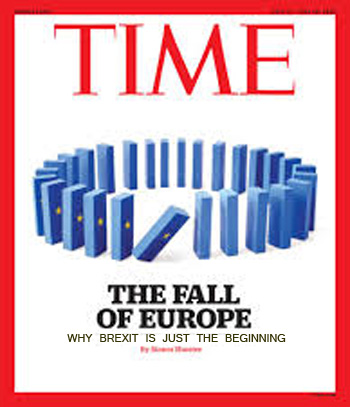 As previously discussed, the EU was originally created to keep the European nations (primarily Germany) from creating another war industry, but over the years it gradually changed. After decades of growing, consolidating and shape-shifting, it formally emerged in 1993 as the “European Union,” a supra-national entity dedicated to bringing the nations of Europe together into one federation.
As previously discussed, the EU was originally created to keep the European nations (primarily Germany) from creating another war industry, but over the years it gradually changed. After decades of growing, consolidating and shape-shifting, it formally emerged in 1993 as the “European Union,” a supra-national entity dedicated to bringing the nations of Europe together into one federation.
Since that time it has explicitly sought to consolidate more power to itself, weaken the sense of national identity amongst Europeans, merge the nations of Europe into a single economic-political bloc and gradually chip away at the sovereign rights and individualities of member States.
What has been touted as the great “European Dream” has shown itself to be a federal despotism where the member States are forced to follow the dictates of the central government on all matters economic, political and military. What started as a club of equality and prosperity is ending as a new tyranny. In the name of a “single Europe” the once proud and autonomous European nations are reduced to increasingly dependent provinces obliged to bow to Brussels, EU's headquarters.
Social effects
Given the revolutionary idealism of the EU there was, following Brexit, an enormous although not unexpected degree of outcry. Media outlets poured forth stories of Brits fleeing the purported bigotry that now gripped their country.
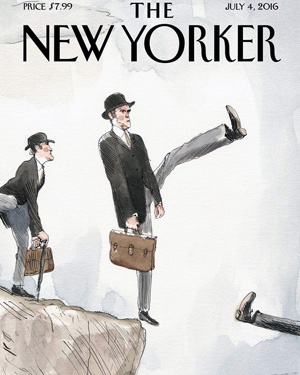 Continental Europeans gushed with sympathy for Brits who “no longer felt at home” in a group of countries – England, Wales, Scotland and North Ireland – where such an unthinkable decision could come to pass.
Continental Europeans gushed with sympathy for Brits who “no longer felt at home” in a group of countries – England, Wales, Scotland and North Ireland – where such an unthinkable decision could come to pass.
Many stories reported on Brits who began to make plans to leave the UK permanently in favor of the EU. Others forecast economic doom for a nation that had the audacity to sever its links with the collective whole of Europe.
Such fabrications indicate that the media has forgotten the ridicule it heaped upon distressed American conservatives who bemoaned the election of Obama some years before.
Despite all of the negative criticism and opposition even within the Great Britain political establishment, at present the referendum results are being honored. Article 50 of the Treaty of Lisbon guarantees any member State the right to quit membership.
Once a process of exit was solicited by Great Britiain, it has two years to negotiate with Brussels the terms. After that, membership ceases, whether negotiations have been agreed upon or not.
The conservative counter-attack
Brexit has shown that not all of Europe is going to fall quietly into EU lines. Despite the risks of economic and political isolation the UK has served as a catalyst to galvanize resistance to the EU. Europeans increasingly alienated by the dictatorial edicts and straight-jacket political correctness of the EU are beginning to express their dissatisfaction.
Hungary already opposes the EU on many points of immigration and homosexual marriage. Poland also offers strong resistance to the EU’s policy of immigration. The Czech Republic recently decided to disconnect its currency from the Euro and let it have its own value.
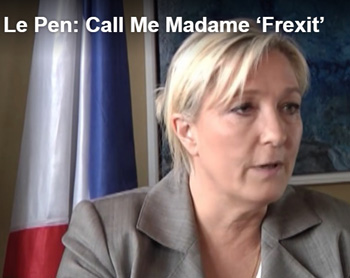 The Netherlands, one of the most liberal States of Europe, has seen the reactionary Freedom Party of Geert Wilders take a large chunk of government seats, while France is now facing the very real possibility of a Marine Le Pen presidency. Le Pen’s main point in her campaign is the exit from the European Union, which she calls Frexit – French exit. Such events reveal the fragility of the EU.
The Netherlands, one of the most liberal States of Europe, has seen the reactionary Freedom Party of Geert Wilders take a large chunk of government seats, while France is now facing the very real possibility of a Marine Le Pen presidency. Le Pen’s main point in her campaign is the exit from the European Union, which she calls Frexit – French exit. Such events reveal the fragility of the EU.
Now, without Great Britain and France it would be extremely difficult for EU to maintain itself because these countries, added to Germany, constitute the organization’s hard core. The other States could be properly described as peripheral States gravitating around that powerful nucleus.
So, if such holes continue to bring water into the vessel of the Union, then, only two outcomes remain: rebuild the ship into a stronger more formidable juggernaut or bid goodbye to the “European Dream.” It is evident the forces of the Revolution would prefer the first.
The crisis
In a 1984 interview, Yuri Bezmenov, a high ranking KGB defector, outlined the ideological subversion tactics employed to bring the West to embrace Socialism. The lynchpin phase of the KGB strategy he called “the crisis.” When a Western nation is eroded psychologically and morally the KGB engineers a national crisis to make it embrace a socialist system. In response to this crisis the people of the country, already prepared by decades of cultural and psychological subversion, adopt by “their own choice” a socialist or para-socialist State.
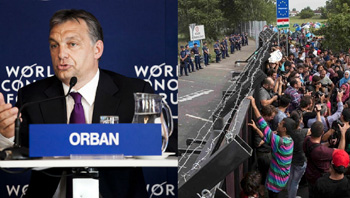 Europe is now in such a crisis. Great Britain is leaving the EU. Greece, Poland, and Hungary protest their bondage to the German backed economic coercion of Brussels. Slovakia, the Czech Republic and Hungary express themselves against the EU migrant quotas. Hungary also takes a stand against homosexuality.
Europe is now in such a crisis. Great Britain is leaving the EU. Greece, Poland, and Hungary protest their bondage to the German backed economic coercion of Brussels. Slovakia, the Czech Republic and Hungary express themselves against the EU migrant quotas. Hungary also takes a stand against homosexuality.
Fear and uncertainty wracks the hearts of common Europeans haunted by the violence of Islamic immigrants ushered in by impenitent Eurocrats. In Brussels, leaders jeer at the concept of “national identity.” Under these strains Europe finds itself in the midst of Bezmenov’s crisis, a crisis that will see Europe fall into one of two paths.
Conclusion
Brexit is, to date, the greatest disaster to befall the EU and its ambitions of building a single Europe. Having the large, powerful and prestigious UK withdrawing its membership has emboldened opposition to the EU and shown that Brussels is not the indisputable arbiter of all European affairs.
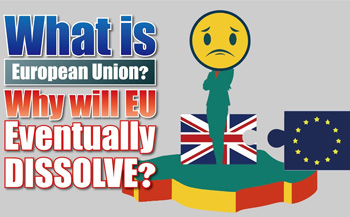 Britain’s exiting the stage and France also considering doing the same make it increasingly obvious that the EU is a system run by one power: Germany. And it is uncertain how long the other countries of Europe will be content to be clearly dependent of the German leadership under an increasingly less convincing façade of equality.
Britain’s exiting the stage and France also considering doing the same make it increasingly obvious that the EU is a system run by one power: Germany. And it is uncertain how long the other countries of Europe will be content to be clearly dependent of the German leadership under an increasingly less convincing façade of equality.
Will the EU dissolve as the nations of the West re-assert their national identity and interests? Or will it consolidate into a supra-national tyranny controlled by Brussels? Will globalism succeed in wiping away any idea of nation that conflicts with the goals of a Pan-Europe? These are points to be carefully watched.
Continued


Will Britain be the first of many to opt out of the EU?
Since that time it has explicitly sought to consolidate more power to itself, weaken the sense of national identity amongst Europeans, merge the nations of Europe into a single economic-political bloc and gradually chip away at the sovereign rights and individualities of member States.
What has been touted as the great “European Dream” has shown itself to be a federal despotism where the member States are forced to follow the dictates of the central government on all matters economic, political and military. What started as a club of equality and prosperity is ending as a new tyranny. In the name of a “single Europe” the once proud and autonomous European nations are reduced to increasingly dependent provinces obliged to bow to Brussels, EU's headquarters.
Social effects
Given the revolutionary idealism of the EU there was, following Brexit, an enormous although not unexpected degree of outcry. Media outlets poured forth stories of Brits fleeing the purported bigotry that now gripped their country.

The New Yorker presents Britain as stupidly walking off a cliff
Many stories reported on Brits who began to make plans to leave the UK permanently in favor of the EU. Others forecast economic doom for a nation that had the audacity to sever its links with the collective whole of Europe.
Such fabrications indicate that the media has forgotten the ridicule it heaped upon distressed American conservatives who bemoaned the election of Obama some years before.
Despite all of the negative criticism and opposition even within the Great Britain political establishment, at present the referendum results are being honored. Article 50 of the Treaty of Lisbon guarantees any member State the right to quit membership.
Once a process of exit was solicited by Great Britiain, it has two years to negotiate with Brussels the terms. After that, membership ceases, whether negotiations have been agreed upon or not.
The conservative counter-attack
Brexit has shown that not all of Europe is going to fall quietly into EU lines. Despite the risks of economic and political isolation the UK has served as a catalyst to galvanize resistance to the EU. Europeans increasingly alienated by the dictatorial edicts and straight-jacket political correctness of the EU are beginning to express their dissatisfaction.
Hungary already opposes the EU on many points of immigration and homosexual marriage. Poland also offers strong resistance to the EU’s policy of immigration. The Czech Republic recently decided to disconnect its currency from the Euro and let it have its own value.

Le Pen forges ahead in the polls based on her positions on the EU & immigration quotas
Now, without Great Britain and France it would be extremely difficult for EU to maintain itself because these countries, added to Germany, constitute the organization’s hard core. The other States could be properly described as peripheral States gravitating around that powerful nucleus.
So, if such holes continue to bring water into the vessel of the Union, then, only two outcomes remain: rebuild the ship into a stronger more formidable juggernaut or bid goodbye to the “European Dream.” It is evident the forces of the Revolution would prefer the first.
The crisis
In a 1984 interview, Yuri Bezmenov, a high ranking KGB defector, outlined the ideological subversion tactics employed to bring the West to embrace Socialism. The lynchpin phase of the KGB strategy he called “the crisis.” When a Western nation is eroded psychologically and morally the KGB engineers a national crisis to make it embrace a socialist system. In response to this crisis the people of the country, already prepared by decades of cultural and psychological subversion, adopt by “their own choice” a socialist or para-socialist State.

Orban's popularity soars in Hungary with his strong opposition to immigration & EU demands
Fear and uncertainty wracks the hearts of common Europeans haunted by the violence of Islamic immigrants ushered in by impenitent Eurocrats. In Brussels, leaders jeer at the concept of “national identity.” Under these strains Europe finds itself in the midst of Bezmenov’s crisis, a crisis that will see Europe fall into one of two paths.
Conclusion
Brexit is, to date, the greatest disaster to befall the EU and its ambitions of building a single Europe. Having the large, powerful and prestigious UK withdrawing its membership has emboldened opposition to the EU and shown that Brussels is not the indisputable arbiter of all European affairs.

Many commentators on the web are posing the question of EU's natural end
Will the EU dissolve as the nations of the West re-assert their national identity and interests? Or will it consolidate into a supra-national tyranny controlled by Brussels? Will globalism succeed in wiping away any idea of nation that conflicts with the goals of a Pan-Europe? These are points to be carefully watched.
Continued

Posted April 24, 2017
______________________
______________________
 Volume I |
 Volume II |
 Volume III |
 Volume IV |
 Volume V |
 Volume VI |
 Volume VII |
 Volume VIII |
 Volume IX |
 Volume X |
 Volume XI |
 Special Edition |


